At first glance, social networks are filled up with innocent polls, games and tests, urging people to be remembered on certain topics: “What was your first job”, “What was your first car”. The problem with participating in these informal surveys is that in this way you inadvertently give answers to “secret questions” that you can use to open access to a large number of your accounts.
I guarantee that a large percentage of technical blog readers would never answer, honestly or unfairly, to such questions (except for the desire to scold their participants). But, I think, this is still worth mentioning, as some social networks, especially Facebook, seem to be simply buried under these cunning tricks for data collection. Moreover, I constantly ask friends and relatives to stop participating in such surveys and stop encouraging my acquaintances to do so.
At first glance, such simple questions can not seem to be more than just an attempt to involve the game from benevolently-minded companies and individuals. However, your answers to these questions may remain online for an indefinitely long time, which will enable people who steal other people's personalities and fraudsters to get access to your online accounts.
Consider, for example, the following survey posted on Facebook by San Benito Tire Pros, which specializes in tire and car repairs in California. The recording asks users: “What car did you learn to drive with a manual gear?”
I hope it’s clear that for most people the answer will be the same as the answer to the question “What was your first car?” - and this is one of the “secret questions” most often used by banks and other companies so that users can update their password or access your account without knowing the password.
 This simple poll was shared more than 250 times a week. Thousands of users honestly answered it, and thus linked their online profile with the answer.
This simple poll was shared more than 250 times a week. Thousands of users honestly answered it, and thus linked their online profile with the answer.Probably the most famous and common secret question, “What was the name of your first pet?” Appears in a huge number of polls on Facebook, and, surprisingly, thousands of people respond voluntarily and probably truthfully. When I see such a poll, I usually recall a
funny interview in 2007 , in which John Stewart casually asked Bill Gates about the name of his first pet.
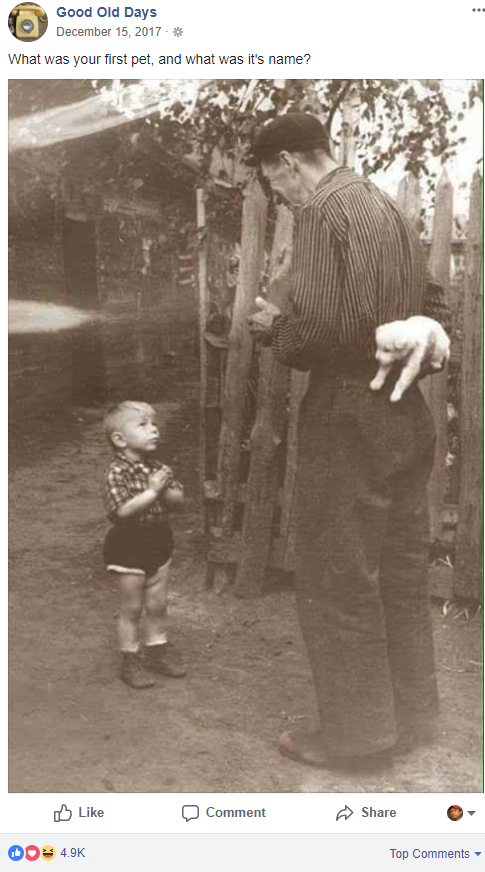 Nearly 5,000 Facebook users answered this question, often used to update a password.
Nearly 5,000 Facebook users answered this question, often used to update a password.Womenworking.com asked one of the variants of the same question to its readers from Facebook and received an impressive number of answers:
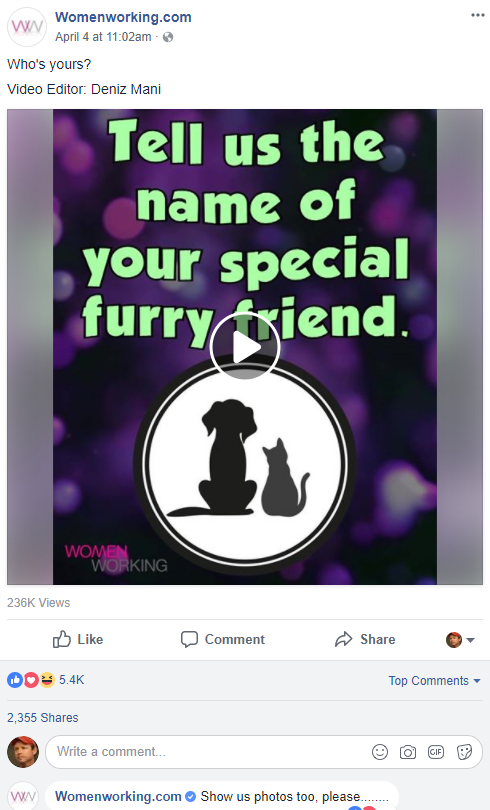
And here is another great survey online store springchicken.co.uk from Britain. He asks visitors to tell everyone the answer to another popular secret question, “What street did you grow up on?”.
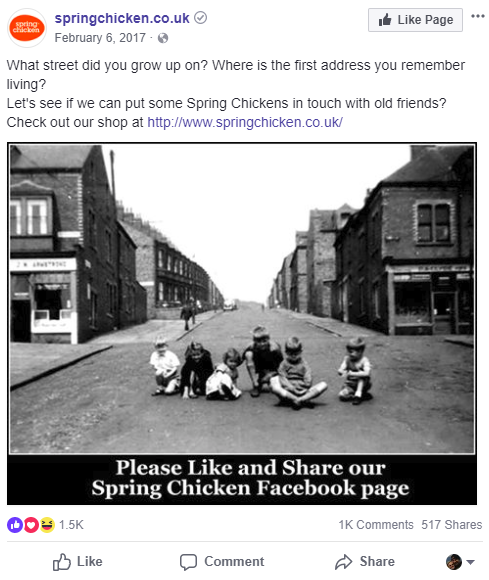 More than 500 Facebook users shared this survey with their network, and more than a hundred shared their answers using their real name and profile links.
More than 500 Facebook users shared this survey with their network, and more than a hundred shared their answers using their real name and profile links.The next question from a Facebook user called Rving.how - a site for jeep owners - sounds like, "What was your first job?" How this survey can be related to jeep trips is completely incomprehensible to me, but this did not stop people from publishing answers.
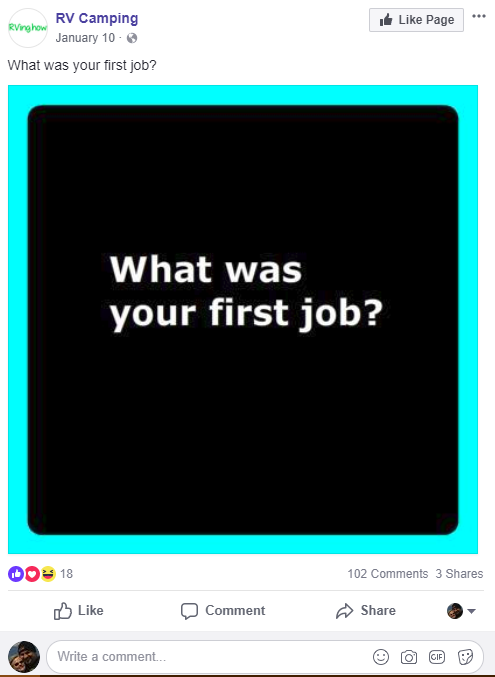
The question “which talisman your school team had” was another common secret question, and nevertheless, it can be found in many Facebook posts:
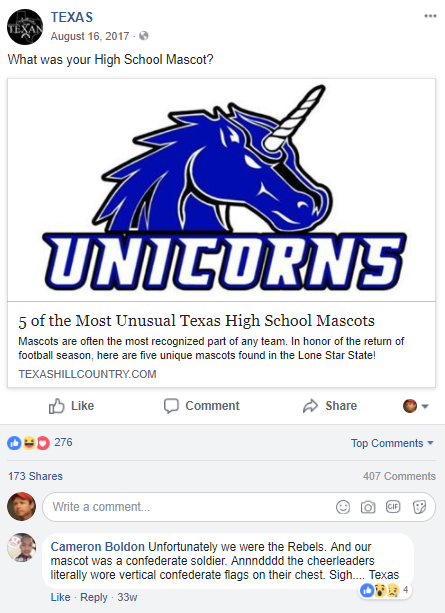
Among the most popular secret questions are such as “Where did you meet your spouse or partner?”. Apparently, a lot of people want to share this information online:

And here is another beauty from Womenworking. Who among us has not used such a secret question ("What is your favorite movie")? Answering it truthfully, in a poll on Facebook, or somewhere in your profile is a bad idea.
Do you remember the name of your first teacher? Do not worry if you forget it after you answer this question, Facebook will remember it for you.

I have never met the secret question, "What was the first concert you attended," but it is also quite unique, not worse than other secret questions, and I would not be surprised if it was used in some companies. However, “Your favorite music band”, a uniquely popular secret question:
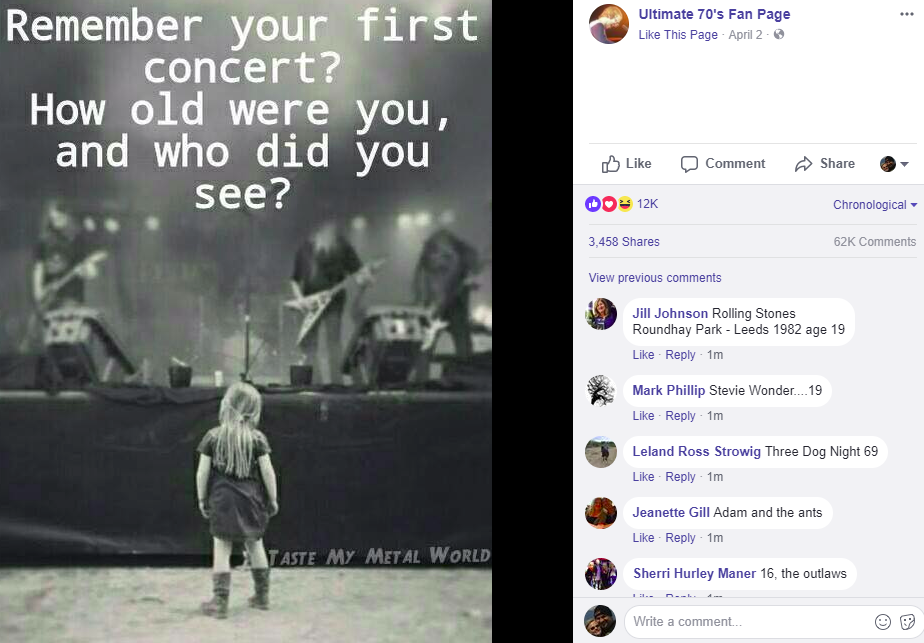
If you distribute information about yourself, your preferences and preferences, this can lead to various unexpected consequences. This practice may have even helped influence the election. Recall the
scandal with Cambridge Analytica , which collected data on more than 50 million Facebook users without their knowledge, and used them to build behaviors to influence potential election participants in various political campaigns.
I hope that readers of my blog will not decide that I encourage the practice of using secret questions as a suitable authentication method. I have been protesting against it for years, precisely because the answers to these questions are often very easy to find with the help of online services and profiles in social networks.
But if you have to work with a company that forces you to choose secret questions, then it would be a very good idea not to answer them honestly. Make sure you have a method to remember your wrong answer, if you forget at some point exactly how the questionnaire was deceived.